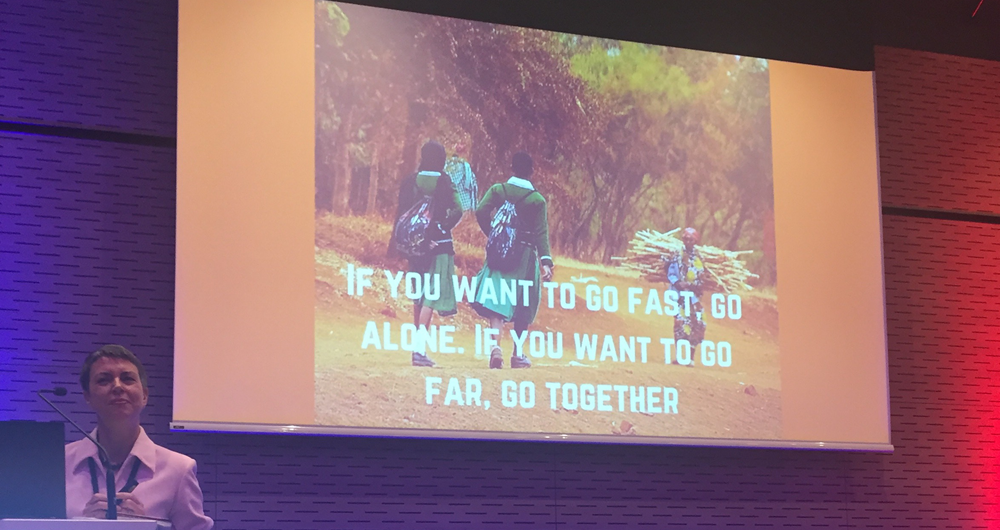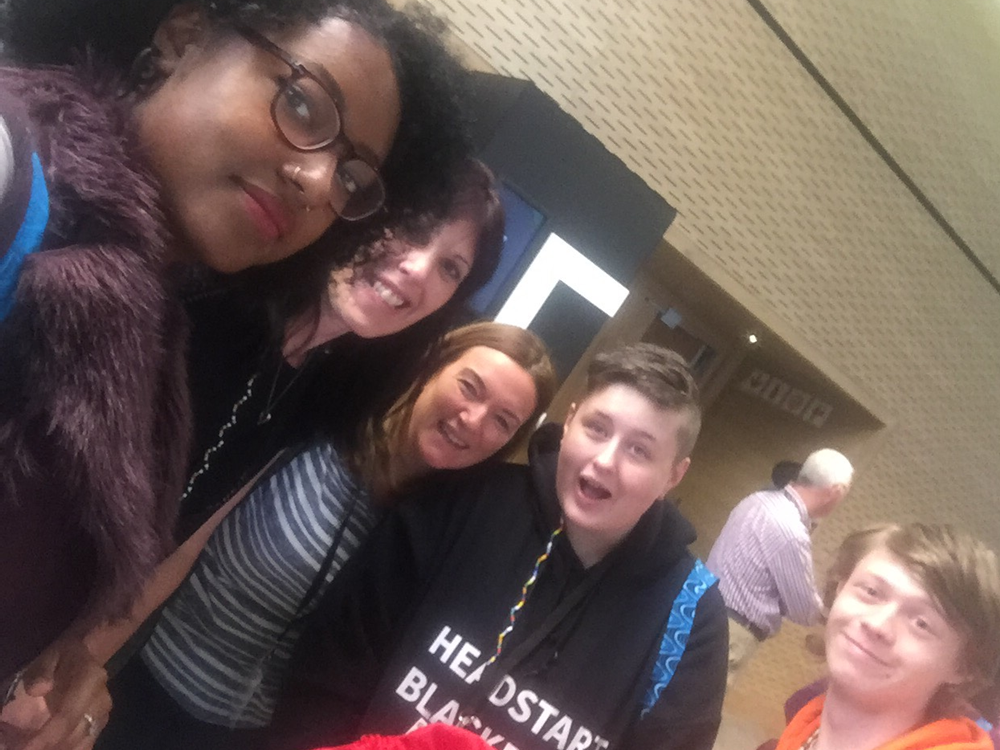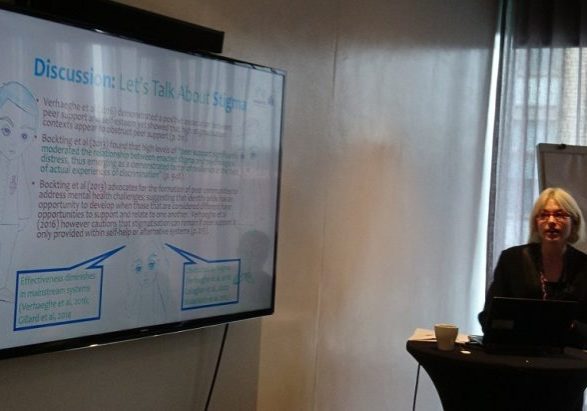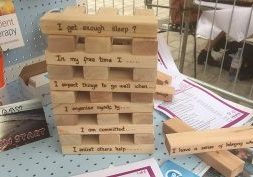Boingboing blogs from… South Africa
Pathways to Resilience IV: Global South Perspectives, Day Two, 15 June 2017
By Mirika Flegg, Boingboinger
It was a very early start for our second day at the Pathways to Resilience Conference in South Africa, with the first session starting at 8am. I had already presented my research on peer support and resilience on Day One, so today was all about just soaking up the work that other people were doing.
My 8am session started with a focus on Resilience and Youth in Care presented by Gerald Jacobs of ProSEED Transitional Support Programme in South Africa. Gerald came into the session in full character mode; reenacting a composite of stories from youth he had worked with in his many years as a youth worker. His character, named Arie, told of his life on the streets and subsequent move to a children’s home – how he had found support from a youth worker who taught him to cook and connected him to his auntie and the story of his ancesters’ displacement from District Six. The reenactment was moving, and Arie was called on subsequently from the second presenters, Myrna McNitt from the USA and Jill Worral from New Zealand. Their presentation ‘Who am I? Understanding and Promoting Resilience and Social Identity in Foster Children’, discussed relevant policy and theoretical perspectives interwoven with personal stories and Arie’s character helped bring these to life. The discussion on kinship care especially hit home, knowing that many young people in care are separated from their cultures in addition to their families, and how policies sometimes perpetuate this. Together the sessions demonstrated policy and professional support differences between countries yet ultimately reminded the attendees that youth in care, just like all of us, need a sense of belonging and identity pride. I also learned about the International Foster Care Organisation which I had not heard of before.
While I had planned to attend a second session on youth facing complex challenges, I instead decided to attend an Indigenous Perspectives session (with Jenn Miller, USA/Amada Urbina, USA/Shane Theunis-Sen, Canada). Coming from Canada and New Zealand, I have a strong personal connection to indigenous communities and culture. Perhaps because of this background, I found the second session calming. I suppose this just reinforced how cultural connection can be grounding. The first two presenters especially reflected more of my experiences of working collaboratively with young people and practitioners, using metaphors, mentorship and creative arts practices to involve individuals in inclusive, culturally appropriate and fun ways.
 Linda Theron’s presentation discussing the collectivist culture in South Africa
Linda Theron’s presentation discussing the collectivist culture in South Africa
Next it was on to the keynote with Micheal Ungar and Linda Theron. I listened with earnest as Linda described South African culture as collectivist in comparison to Canadian culture. For me, Canadian culture is at its core collectivist because of our connections to Aboriginal culture. As a Canadian, the cultural genocide(s) we have experienced in our history of colonization (and it’s seemingly everlasting impacts) seem decidedly less different from the South African context than one would be lead to believe. Having lived in Canada and New Zealand, these impacts of British colonization are often discussed in the shadows, but seemingly left out of mainstream discussions. I think not bringing it into the discussion represented a massive missed opportunity. Linda Theron’s work especially resonated with me. Her findings, especially surrounding parenting as almost a shared community endeavor, in my opinion feels more like my understanding of communities in my countries that have faced cultural oppression. I would be interested to see if this was the case and would love for her findings to be compared with Aboriginal communities in Canada and Australia and Maori in New Zealand. Little research has actually considered the lasting impacts of colonization across countries and I would happen to guess that “resilience to colonization” has included the formation of more collectivist cultures because so many children were separated from their parents/cultures. This is still true today. Currently in Canada for example, we have more Aboriginal children in foster homes outside of their culture than we had children in residential school systems twenty years ago. The impacts of colonization are still felt.
 (Left to right) Boingboing staff Shahnaz Biggs poses with HeadStart staff Sharron Butler, Lisa Mills, Ollie Gibbs and Josh Thompson after their presentation on HeadStart Blackpool
(Left to right) Boingboing staff Shahnaz Biggs poses with HeadStart staff Sharron Butler, Lisa Mills, Ollie Gibbs and Josh Thompson after their presentation on HeadStart Blackpool
In the afternoon, my sessions focused on HeadStart. I first attended the ‘Resilience from an Educational Perspective’ presented by Sharron Butler, Lisa Mills, Ollie Gibbs and Josh Thompson about HeadStart in Blackpool. It was a pretty exciting session because the young people involved in the project were Skyping into the session and it was amazing to see such a whole-town approach.

I also went to see a presentation of the UK-wide HeadStart by Neil Humphrey “Exploring the intersection between cumulative risk and protective factors in predicting mental health difficulties among children and young people”. I found the statistical analysis part of this session very interesting (multi-level penalized regression with bootstrapping and multiple imputation) as I am interested in developing my statistical skills. What I did find concerning was that young people were not being consulted, that I could tell, on the findings of the analysis. For example, one of the findings was that Empathy was appearing as a risk factor when it was predicted it would be a preventative factor. However this was with a sample of young people aged 10-16 and there are a number of studies that suggest empathy is often developed later in life (starting around age 8). So I asked, “Is there a relationship between those that scored high for known risk factors (example poverty as assessed by free school meals) and those that show high empathy scores, because if it is highly developed in younger youth, it could be possible that these young people are having more ‘adult-type’ experiences at a younger age which would lead them to develop empathy sooner than one would expect?” It hadn’t been looked at, but I am hoping they do. Depending on how they identified ‘empathy’ from their included scales, this finding could be very helpful from a teacher/practitioner perspective. For example, young people who may need some additional help may be able to be ‘spotted’ by how empathetic or how sensitive they are to other people’s feelings. Wouldn’t it be nice to be able to approach youth with, “I noticed that you are very good at helping others, but I just wanted to have a conversation with you about where you get help from if you need it?” rather than taking a deficit approach to identifying youth at risk? Could this be an example of why those with personal experience of adversity, and those that support them, should be involved in the analysis of research findings?
My last session of the day was a symposium on ‘Mentorship and youth engagement – how to increase community capacity to support youth mental health’. These presentations by Lisa Lachance, Don Mahleka and Christine Wekerley focused on youth engagement in Canada. Some of the activities to bring together academics, policy makers, those with lived experience, practitioners etc included Wisdom2Action offered by the CYCC Network. This network produces ‘knowledge synthesis reports’ that follow three methodological stages including, 1) a scoping review, 2) an environmental scan, 3) case examples- to consider literature, local knowledge and practice-based evidence. However, in reviewing the reports on the website they are still written in a way that feels like they are ‘about youth’ rather than ‘with youth’ (i.e. corporate images, referring to young people as ‘at risk’ etc). It does seem like we are moving to a more collaborative way of researching, but I hope the future will bring more inclusive methodologies, analysis methods and knowledge distribution methods. At the moment, I think they are insufficient, especially in regards to acknowledging the ideas and contributions of non-academics/non-clinicians.
What attending this conference made me understand even more is that there is a lot of great work out there, but I am very lucky to work for Boingboing, which is pretty innovative when it comes to inclusive research and valuing the direction (not just input) from those with personal experience of illness and adversity.

